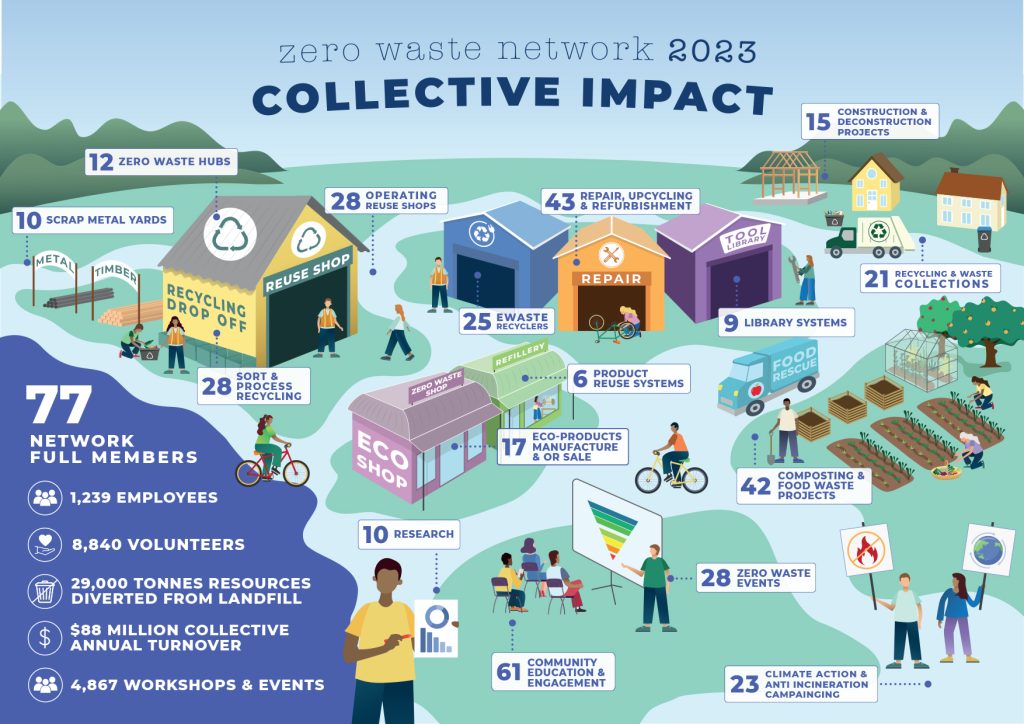Zero Waste Hubs: Developing a nationwide Resource Recovery Network
One of the goals of the Zero Waste Network is to develop a nationwide network of resource recovery centres using local scale Zero Waste Hubs as the basic building blocks.

What is a Zero Waste Hub?
Local Zero Waste Hubs combine reuse, repair, recycling, composting, product stewardship takeback, behaviour change and community engagement. In essence, a Zero Waste Hub is the transformation of the functions of a Transfer Station. There are already a number of successful Zero Waste Hubs bringing the circular economy to life in their communities like Xtreme Zero Waste in Whāingaroa, Wastebusters in Wanaka and Alexandra, Sustainability Trust in Pōneke and the Auckland Community Recycling Centre Network. Members deliver practical services and integrated behaviour change programmes. It also contains many small-to-medium enterprises (SME) and other organisations working in the zero waste and circular economy space.
Our community focused business model for Zero Waste Hubs uses recycling and reuse as a vehicle to deliver on broader social, economic and environmental outcomes such as the promotion of community development, employment, reducing the need for new landfills, local resilience, preventing pollution, saving energy, and reducing greenhouse gas emissions.
Each site has deep connections into the local community and longstanding relationships with a wide range of SME and organisations. Many of whom are working towards zero waste or integrating zero waste and circular economy principles into their business models. Together they are working on waste reduction, reuse, recycling, events, composting and food resilience, behaviour change and awareness raising, product refinement, system change and collaboration across industry groups.
There are many opportunities to scale and replicate across these networks. We are working on quite a few different projects that involve partnership approaches building on existing and developing relationships. A number of our members are working on different stages of projects to develop, operate or expand eco parks and zero waste hubs. All of this work involves piloting, prototyping and testing new working arrangements, contracting mechanisms, business models and funding and financing arrangements.
Why build a Zero Waste Hub?
All the goods, materials and packaging that flow out through the supply chain also need to flow back up the recovery chain so we can reuse, repair, recycle, compost etc. This is the missing piece in the thinking that created our waste problems in the first place. A Nationwide Resource Recovery Network is a critical piece of public infrastructure that needs to be built into the Circular Economy and Waste Strategies from the beginning.
We need to do a great job of this so our export industries and tourism industries can prove they are doing the right thing in global markets. We also need to do it so we can hold our heads up high as citizens of Aotearoa knowing that our everyday activities at home and work are increasing wellbeing.
We urgently need to develop an evidence-based, long-term approach to national resource recovery. This needs to go way beyond recycling to create a fully integrated resource recovery chain network. It would encompass: waste prevention, reuse, repair, refillables, composting, remanufacturing, closed-loop recycling. It would look at competition between modes, ownership structures, regulatory regimes and the infrastructure investment required to improve the effectiveness and sustainability of New Zealand’s recovery chains.
How to build a Zero Waste Hub
Facilities and infrastructure need to be owned and operated by parties with an incentive and a desire to change the game and innovate over time. Big commercial waste companies have an interest in maintaining the status quo and this has stymied progress on resource recovery.
Land based assets with services, landscaping and buildings that can be converted to new uses over time are best put in the hands of purpose driven Māori, Pasifika and Community Enterprise operators through social procurement processes so that public opex funding and other revenue streams can be converted into a public asset base.
READ ABOUT LOCALISED >> the commercial arm of the Zero Waste Network is working with communities now to working to increase the number of community-led resource recovery enterprises and projects operating across Aotearoa.
Local ownership generally ensures a wider range of interconnections, co-benefits and a long term view of the impact on the community, local economy and environment of enterprise activity. It is critical that we build diversity in the supply market to grow innovation, opportunity and capacity as well as local multiplier effect.
Ownership and operation by local scale operators is especially important in customer facing activities as service delivery and behaviour change are intertwined. Service users can get advice and support to up their game when the operators with the right approach, knowledge, experience and incentive are running facilities.
Product stewardship is one of the best tools to manage and fund the movement of products and materials through supply, use and recovery chains – and it sits at the heart of the Zero Waste Hub model. It brings the circular economy to life by sharing responsibility for products over their whole lifecycle. Product stewardship scheme revenues can be used to cover opex and capex costs of establishing this public good infrastructure. As an example, the plan for a national Container Return Scheme (CRS) is underway that could create great local opportunities. CRS would recover the 2+ billion beverage containers (glass, plastic, aluminium and liquid paperboard) consumed each year by applying .20 cent deposit is applied to each beverage container. Under a mandatory CRS, at least 85% of these containers would be recovered from the litter and waste streams and recycled, with the potential to create hundreds of new businesses, thousands of new jobs and large cost savings for ratepayers and local authorities just from the few cents handling fee from each container.



